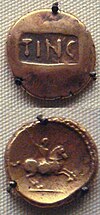Atrebates
The Atrebates (Gaulish: *Atrebatis, 'dwellers, land-owners, possessors of the soil') were a Belgic tribe of the Iron Age and the Roman period, originally dwelling in the Artois region.
[1] After the tribes of Gallia Belgica were defeated by Caesar in 57 BC, 4,000 Atrebates participated in the Battle of Alesia in 53, led by their chief Commius.
[2] An offshoot of the Belgic tribe probably entered Britain before 54 BC, where it was successively ruled by kings Commius, Tincommius, Eppillus and Verica.
It derives from the Proto-Celtic stem *attreb- ('settlement') attached to the suffix -atis ('belonging to'), the former descending, as a result of an assimilation from an earlier *ad-treb-, from the Proto-Indo-European root for 'settlement', *treb- (cf.
[12] In the mid-first century BC, an offshoot of the tribe lived in Britain, where they occupied a region stretching between the Thames, the Test, and West Sussex.
[citation needed] When no battle was forthcoming, the Belgic alliance broke up, determining to gather to defend whichever tribe Caesar attacked.
After Vercingetorix's defeat at the Siege of Alesia, Commius had further confrontations with the Romans, negotiated a truce with Mark Antony, and ended up fleeing to Britain with a group of followers.
However, he appears to have retained some influence in Gaul: coins of post-conquest date have been found stamped with his name, paired with either Garmanos or Carsicios, who may have been his sons or regents.
Archaeologist Barry Cunliffe argues that they "seem to have comprised a series of indigenous tribes, possibly with some intrusive Belgic element, given initial coherence by Commius".
Numismatic and other archeological evidence suggests that Tincomarus took a more pro-Roman stance than his father, and John Creighton argues from the imagery on his coins that he was brought up as an obses (diplomatic hostage) in Rome under Augustus.
It appears Tincomarus was ousted by his brother, and from this point Eppillus's coins are marked "Rex", indicating that he was recognised as king by Rome.
Verica regained some territory following Epaticcus's death in about 35, but Cunobelinus's son Caratacus took over the campaign and by the early 40s the Atrebates were conquered.
[citation needed] After the Roman conquest, part of the Atrebates' lands were organized into the pro-Roman kingdom of the Regni under Tiberius Claudius Cogidubnus, who may have been Verica's son.

